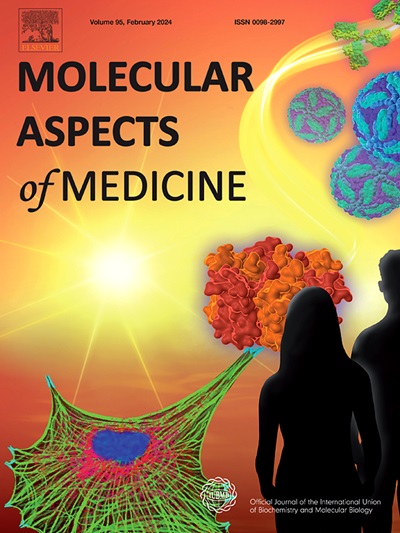Adiponectin: its role in diabetic and pancreatic cancer
IF 10.3
2区 医学
Q1 BIOCHEMISTRY & MOLECULAR BIOLOGY
引用次数: 0
Abstract
Adiponectin (ApN) is an antidiabetic and anti-inflammatory protein synthesized by adipose tissue. It is essential in regulating insulin sensitivity, glucose, and lipid metabolism by controlling AMPK, PPARα, and MAPK signals. It is an anti-inflammatory property that protects pancreatic β-cells. Often, low levels of ApN are linked to obesity, type II diabetes and the development of PDAC. However, changes in lifestyle and the use of certain drugs can improve ApN function and insulin sensitivity. PDAC is a highly aggressive cancer linked to obesity, type II diabetes, and insulin resistance. ApN plays a complex role in PDAC progression and can suppress PDAC development by weakening β-catenin signaling. Decreases in ApN levels are associated with increased PDAC risk in diabetic patients. PDAC and diabetes are interconnected through the development of insulin resistance, islet dysfunction, change in immunological response, inflammation, oxidative stress, and altered hormone secretion. Genetic studies highlight specific genes like HNF4G and PDX1 that influence both conditions and miRNAs such as miR-19a promote tumor progression through the PI3K/AKT pathway. This review discusses the role of ApN in diabetes and PDAC and the interrelation between diabetes and PDAC.

脂联素在糖尿病和胰腺癌中的作用
脂联素(Adiponectin, ApN)是一种由脂肪组织合成的抗糖尿病和抗炎蛋白。它通过控制AMPK、PPARα和MAPK信号来调节胰岛素敏感性、葡萄糖和脂质代谢。它具有抗炎特性,可以保护胰腺β细胞。通常,低水平的ApN与肥胖、II型糖尿病和PDAC的发展有关。然而,生活方式的改变和某些药物的使用可以改善ApN功能和胰岛素敏感性。PDAC是一种高度侵袭性的癌症,与肥胖、II型糖尿病和胰岛素抵抗有关。ApN在PDAC的发展过程中发挥着复杂的作用,可以通过削弱β-catenin信号传导抑制PDAC的发展。糖尿病患者ApN水平降低与PDAC风险增加相关。PDAC和糖尿病通过胰岛素抵抗、胰岛功能障碍、免疫反应改变、炎症、氧化应激和激素分泌改变而相互关联。遗传学研究强调了HNF4G和PDX1等特定基因对两种疾病都有影响,而miR-19a等mirna通过PI3K/AKT通路促进肿瘤进展。本文就ApN在糖尿病和PDAC中的作用以及糖尿病与PDAC的相互关系作一综述。
本文章由计算机程序翻译,如有差异,请以英文原文为准。
求助全文
约1分钟内获得全文
求助全文
来源期刊

Molecular Aspects of Medicine
医学-生化与分子生物学
CiteScore
18.20
自引率
0.00%
发文量
85
审稿时长
55 days
期刊介绍:
Molecular Aspects of Medicine is a review journal that serves as an official publication of the International Union of Biochemistry and Molecular Biology. It caters to physicians and biomedical scientists and aims to bridge the gap between these two fields. The journal encourages practicing clinical scientists to contribute by providing extended reviews on the molecular aspects of a specific medical field. These articles are written in a way that appeals to both doctors who may struggle with basic science and basic scientists who may have limited awareness of clinical practice issues. The journal covers a wide range of medical topics to showcase the molecular insights gained from basic science and highlight the challenging problems that medicine presents to the scientific community.
 求助内容:
求助内容: 应助结果提醒方式:
应助结果提醒方式:


